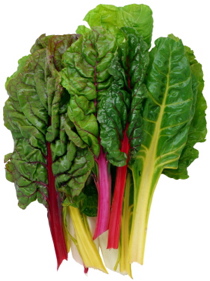Chard

Chard is a relative of beets and spinach. It has a slightly bitter and salty flavor that becomes stronger as the leaves mature.
Avoid brown or wilted leaves or leaves with small holes. To preserve freshness, store unused chard in a plastic bag in the refrigerator.
See also Leafy Greens.
| Serving size: | 100 g (about 3 cups) |
Health Benefits
| Hydrochloric Acid | Stimulates production of hydrochloric acid in the stomach. |
Nutrients
| Calcium | 51 mg | 4% | |
| Iron | 1.8 mg | 12% | Young swiss chard contains more iron. |
| Magnesium | 81 mg | 20% | |
| Manganese | 0.4 mg | 13% | |
| Potassium | 379 mg | 11% | |
| Vitamin A | 6116 IU | 122% | Especially high in beta carotene. |
| Vitamin K | 830 mcg | 1038% | |
| Zinc | 0.4 mg | 3% |
